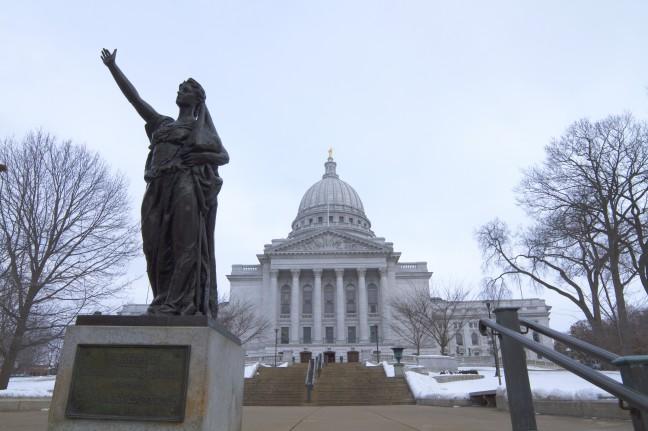Early in Gov. Scott Walker’s second term, many are predicting the $2.2 billion budget shortfall will have potential implications for University of Wisconsin and transportation.
The bi-annual budget is the balance between expected revenue and spending. The current budget period will end June 30, 2015. Before then, the state budget must be in equilibrium, balancing out the current $2.2 billion shortfall for the 2015-17 budget.
Throughout his first term, Walker prioritized cutting taxes. During his State of the State Address, he said he was proud of the reduced property taxes with property taxes on a typical Wisconsin home were $141 lower in 2014 compared to 2010.
“My pledge to you is that property taxes four years from now will be lower than they were in 2014,” Walker said in his address.
With the budget shortfall, Walker’s plan to expand tax cuts is complicated, Jon Peacock, director of the Wisconsin Budget Project, said. He said it will be difficult to cut taxes further when there is a large budget gap to begin with.
But Peacock said the tax cuts come with a price. He said the university system could be affected due to a lack of available spending. Continued tax cuts could mean education may not receive the amount of money that was originally expected.
Without available funds, Peacock said there would be downward pressure on salaries and benefits, affecting the university’s chance to compete for the best faculty.
“I am very worried what this could mean for the university system,” Peacock said.
Along with less money for salaries, Peacock said lack of funding could also result in faculty cuts, leading to less available classes. This would make it hard for students to get the classes they want, harming the quality of the education system, he said.
For the UW System, tuition was frozen for the 2013-15 budget. Andrew Reschovsky, a UW-Madison professor of public affairs and applied economics, said the motive behind the frozen tuition was to make college more affordable. The downside is that there are less revenues for university system, he said.
Walker has proposed another two-year tuition freeze for the 2015-2017 budget, which Reschovsky said relies on balancing the budget.
“Revenue might not be enough to cover time and spending,” he said. “The current budget needs a balance in the end.”
Both Reschovsky and Peacock agreed it is hard to foresee whether the budget shortfall will affect Walker’s potential presidential bid. Peacock said Walker is likely to be more focused on positioning himself to win the Republican primary.
For the upcoming budget, the Department of Transportation needs more funding. Peacock said highway builders and business people want the state to spend more on highway building and repairs.
Reschovsky said the secretary of transportation is asking for an increase in gas taxes to make up for the lack of funding.
If that does not happen, Peacock said there is a chance that more money from the general fund will be transferred to the transportation fund, resulting in less money for education and healthcare.
“It will be interesting to see how that plays out,” Peacock said. “To see how the desire among many conservatives to spend more on transportation is balanced against their distaste for increased taxes and fees to pay for it.”
Walker will announce his 2015-17 budget proposal Feb. 3.


